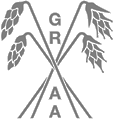THE GRAVESEND & ROCHESTER AGRICULTURAL ASSOCIATION
"The Gravesend and Rochester Agricultural Association for the encouragement of servants and labourers” was established at a meeting held at The Falcon Tavern, Gravesend on 9 April 1834.
Owing to cheap imports of foreign grain, the 1830’s were, as now, a time of great depression in agriculture. Labourer’s pay was poor and farmers, faced with poor returns, were unable to match the money being offered by the local paper, cement and other commercial ventures developing from the Industrial Revolution.
The founding members of the Association were mostly local landowners and members of the church. The first president was Lord Darnley of Cobham Hall and the first chairman was William Smith-Masters of Camer Park.
Many agricultural and ploughing associations were formed at around this time, the GRAA is believed to be the second oldest still in existence and it is almost certainly the oldest continuously to have held competitions, wars excepted, since its foundation.
At the outset, the aims of the Association were to encourage farm workers to stay on the land by holding competitions offering prizes for excellence in skilled labour and craftsmanship. Early prizes included an award of £3 for the best ploughman using 4 horses, £3 for a shepherd rearing the greatest number of lambs, £2 for the best hop drier and prizes of between £1 and £3 for farm workers with long records of service under a particular employer or on the same farm. Curiously, there was a prize of £3 for the labourer bringing up the largest family without resorting to parochial relief. Although these prizes may seem derisory by modern standards, there were given at a time when pay for farm workers averaged between £10 and £15 a year. Despite the poverty apparent amongst the workforce, the minutes of a committee meeting held in October 1849 refers to the members retiring to The Crown Inn at Rochester where they then dined at a cost of 10/6d (52½ p) a head including wine! Quite a sum in those days.
As farming fortunes improved in the last 19th Century the aims of the Association adapted to changing circumstances. Competitions for ploughing, sheep shearing and so forth were still held but, increasingly, so were competitions for employers themselves these being aimed at improving farming standards by offering awards for the best farming practices, crops grown and so forth.
The annual ploughing match and its associated farming skills and crop growing competitions were held continuously from 1834 to 1915 when demands on agriculture necessitated by the Great War forced a temporary halt. The ploughing match itself restarted in October 1919 and although the records are not entirely clear it is probable that this was the first match where tractors were entered for ploughing on a competitive basis.
Tractor ploughing continued to develop in the inter-war years and by 1939, when war again brought a halt to proceedings, approximately half the annual entry in the ploughing match was mechanically propelled with horses clearly beginning to lose favour. Matches recommenced in 1946 with competitive horse ploughing dying out in the early 1950’s although, to this day, they remain a popular demonstration entry as does, increasingly, the vintage tractor ploughing.
